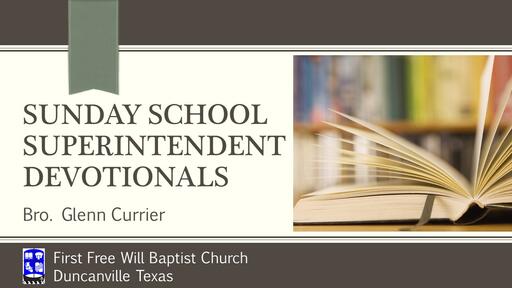A Psalm of Forgiveness (2-21-2021)
Sunday School Superintendent Devotions • Sermon • Submitted • Presented • 9:29
0 ratings
· 39 viewsFiles
Notes
Transcript
Psalm of Forgiveness
2-21-21
Beginning Scripture: Psalm 103: 8-10
"The Lord is compassionate and gracious, slow to anger, abounding in love. He will not always accuse, nor will he harbor his anger forever; he does not treat us as our sins deserve or repay us according to our iniquities." NIV
Psalm 103 starts out as a psalm of thanksgiving and praise but "the theology of forgiveness pervades this psalm and is based on the idea that as long as Israel is God-fearing and committed to upholding its pact with God, whatever trespasses [and sins] no matter how egregious their offenses, they will not be held against Israel by God. (Robert Alter notes on verse 10 in The Hebrew Bible) This lovely psalm makes perfectly clear the overpowering kindness of God and the way he makes an endless distance between us and our sins. This language accentuates the great length God goes to forgive us our sins and the magnitude of his mercy.
Over and over again we hear in Sacred Scripture, songs and verses that lead us to believe that God's mercy is infinitely bigger than ours. But when I read stories of how humans have forgiven offenders who committed unspeakable crimes and violations against them, I am always impressed because I know the other dark side of human tendencies - the ability to hold grudges and seek revenge.
To me, one of the arguments for why Jesus was necessary in the sordid history of human activity is his ability to forgive, and his emphasis on the need for reconciliation. I have heard it said that this was the main reason for Jesus' life: to teach us that reconciliation is possible and desirable. How often does Jesus say to one who has been healed, "Go and sin no more." I think in Jesus' healing and in that command Jesus is showing us his divinity, he is showing us God's nature as described in Psalm 103 and he is teaching us the power of reconciliation. Our Lord is telling the sinner to repent - and then to distance himself from his past patterns, to let the memory of his sins and bad habits fade just enough so that the force of his sins will no longer be like the proverbial lead ball and chain around the ankles, that it is indeed possible to forget our past or at least to distance ourselves from our former darkness and enter into the light of God's kingdom - his kingdom here on Earth and after we leave the confines of our bodies.
I wonder if one of our biggest difficulties sometimes is to forgive ourselves. I know it was difficult for King David. But this psalm and others tell us how relieved he was of the burden of guilt and shame, having admitted his sins, felt remorse for them, and asked for God's forgiveness. Although we could focus on David's shortcomings, his weak, dark side and even identify with him in this weakness, this psalm directs us to see him in the light of God's mercy, to see him as God sees him, as a son whom the Father has forgiven. How often we hear the Bible refer to God as our Father, reminding us that daddies will go far and sacrifice much, even their lives, to bring their children back into the light of grace, back into the kingdom.
Our Sunday School lesson explains that it was God's design to reveal himself to all the nations of the world, that is, God allowed us - our species - to see his true nature throughout the Old Testament. This lesson beautifully points out David's gratitude toward God and how God demonstrated his greatness by forgiveness of our sins, by healing, and by redeeming us from destruction. (p. 80) At this point in the lesson, it became easy for me to cross over from the Old Testament into the New Testament. The New Testament is the witness of God's nature and his work on earth after the birth and death of his son Jesus. In Jesus we can see God's forgiveness and his redeeming work. As I have said before, the story of the Prodigal Son illustrates the great love of a Father for his son, the greatness of the father's ability to forgive, and the redeeming aspect of the father welcoming the son back home, back into the kingdom. Now switch your focus back to David, is not this story of the Prodigal Son essentially the same story alluded to by David in Psalm 103? Do you see the continuity of revelation of God's greatness from the Hebrew Testament to our New Testament?
Now make one more giant leap and think of how this same story comes true in your own life.
Questions and Challenges
* Describe an instance in which you have forgiven someone and welcomed them back into your good graces.
* Give an example of a time in your life that you have been forgiven and welcomed back "home" or back into a relationship with someone.
* How has God shown his greatness in both of these examples?
Prayer
Father thank you for your loving kindness. Thank you for sending your Son to reveal yourself as a tremendous lover. Lord, when I am tempted to hold a grudge, when I am finding it hard to forgive someone for something they have done to offend, hurt, or harm me in some way, remind me of David and Jesus and how in them you revealed your forgiveness, healing, and redemption. Help me to believe that I too can do the same thing with those in my life. I pray these things in the name of your Son our precious Savior and Lord, Jesus Christ. Amen.

